Stress matters! Psychophysiological and emotional loadings of pregnant women undergoing fetal magnetic resonance imaging
- PMID: 25879454
- PMCID: PMC4377003
- DOI: 10.1186/s12884-015-0448-9
Stress matters! Psychophysiological and emotional loadings of pregnant women undergoing fetal magnetic resonance imaging
Abstract
Background: While the application of fetal MRI in high-risk pregnant women is steadily rising, little is known about the psychological consequences of this procedure. The aim of the present study was to investigate emotional and psychophysiological reactions of females undergoing fetal MRI.
Methods: Sixty women (17-44 ys), assigned for fetal MRI, were included. Affective state was assessed by standardized measures of anxiety, emotional states and depressive symptoms. Stress coping strategies were assessed using a self-report questionnaire. Stress responses were determined using skin conductance levels (SCL) during fetal MRI as well as measurement of salivary cortisol levels immediately before and after fetal MRI.
Results: Analysis of fast and slow physiological stress measures revealed significant differences between women with and without a supporting person accompanying them to the examination. For SCLs, lower levels of stress during MRI emerged in accompanied women. Women with well-marked stress-coping-strategies experienced lower levels of stress during the examination. Although fast and slow stress measures before and after MRI did not show significant correlations, a significant difference of SCLs pre and post examination was clearly detectable, as well as a trend of decreased cortisol levels for both time points.
Conclusions: The results imply that the elevation of SCLs is an accurate instrument to assess fast stress alterations in patients during fetal MRI. Stress coping strategies and whether women are accompanied or not play an important role in the experience of anxiety and depressive symptoms. These factors should be considered especially in patients with high-risk-pregnancies to improve patient care.
Figures
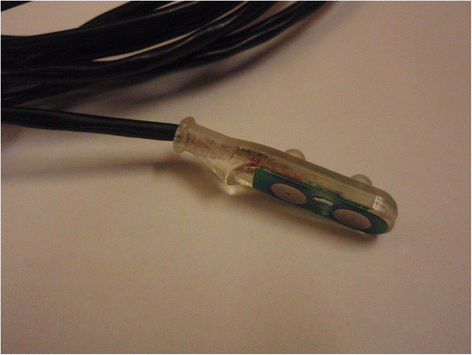
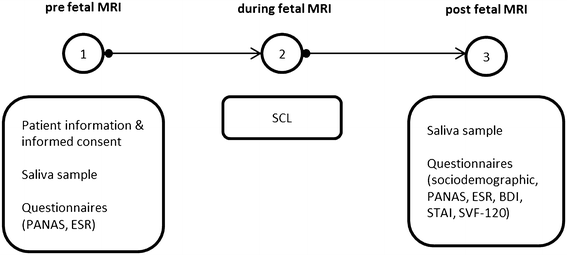
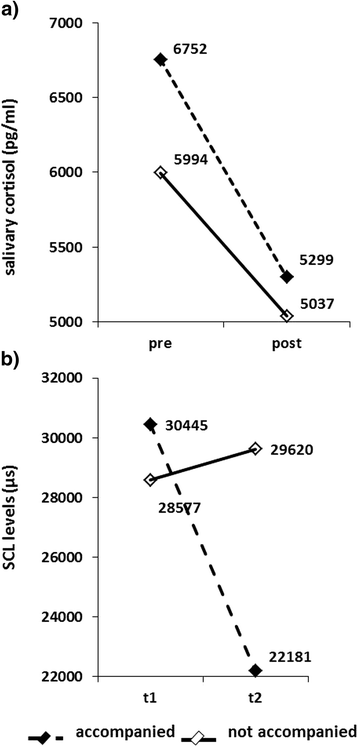
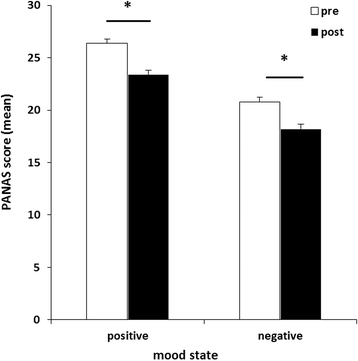
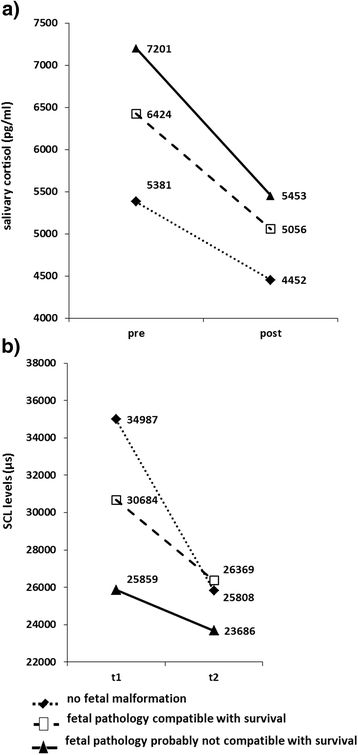
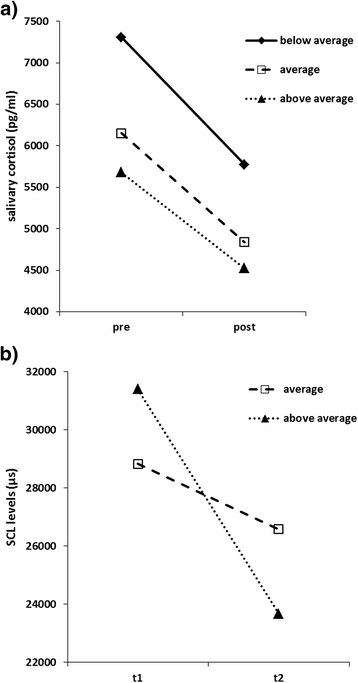
Similar articles
-
Evaluation of Spousal Support and Stress Coping Styles of Pregnant Women Diagnosed with Fetal Anomaly.Medicina (Kaunas). 2025 May 9;61(5):868. doi: 10.3390/medicina61050868. Medicina (Kaunas). 2025. PMID: 40428826 Free PMC article.
-
Anxiety and depressive symptoms, and stress biomarkers in pregnant women after in vitro fertilization: a prospective cohort study.Hum Reprod. 2018 Jul 1;33(7):1237-1246. doi: 10.1093/humrep/dey109. Hum Reprod. 2018. PMID: 29796614
-
Concurrent levels of maternal salivary cortisol are unrelated to self-reported psychological measures in low-risk pregnant women.Arch Womens Ment Health. 2013 Apr;16(2):101-8. doi: 10.1007/s00737-012-0321-z. Epub 2012 Dec 27. Arch Womens Ment Health. 2013. PMID: 23269500 Free PMC article.
-
Questionnaires and salivary cortisol to measure stress and depression in mid-pregnancy.PLoS One. 2021 Apr 23;16(4):e0250459. doi: 10.1371/journal.pone.0250459. eCollection 2021. PLoS One. 2021. PMID: 33891645 Free PMC article.
-
Maternal depression, anxiety and stress during pregnancy and child outcome; what needs to be done.Best Pract Res Clin Obstet Gynaecol. 2014 Jan;28(1):25-35. doi: 10.1016/j.bpobgyn.2013.08.017. Epub 2013 Sep 18. Best Pract Res Clin Obstet Gynaecol. 2014. PMID: 24090740 Review.
Cited by
-
Survey of maternal anxiety and perceptions towards foetal MRI and pre-scan education.J Med Radiat Sci. 2024 Mar;71(1):10-20. doi: 10.1002/jmrs.725. Epub 2023 Sep 19. J Med Radiat Sci. 2024. PMID: 37724764 Free PMC article.
-
Neonatal brain resting-state functional connectivity imaging modalities.Photoacoustics. 2018 Feb 2;10:1-19. doi: 10.1016/j.pacs.2018.01.003. eCollection 2018 Jun. Photoacoustics. 2018. PMID: 29511627 Free PMC article. Review.
-
Preparing patients according to their individual coping style improves patient experience of magnetic resonance imaging.J Behav Med. 2022 Dec;45(6):841-854. doi: 10.1007/s10865-022-00361-y. Epub 2022 Sep 8. J Behav Med. 2022. PMID: 36074316 Free PMC article.
-
Investigation and analysis of magnetic resonance imaging experience and psychological status of patients.BMC Psychol. 2024 Mar 1;12(1):115. doi: 10.1186/s40359-024-01570-7. BMC Psychol. 2024. PMID: 38429641 Free PMC article.
-
Functional Connectivity of the Human Brain in Utero.Trends Cogn Sci. 2016 Dec;20(12):931-939. doi: 10.1016/j.tics.2016.10.001. Epub 2016 Nov 4. Trends Cogn Sci. 2016. PMID: 27825537 Free PMC article. Review.
References
Publication types
MeSH terms
Substances
Grants and funding
LinkOut - more resources
Full Text Sources
Other Literature Sources
Medical
Research Materials
Miscellaneous

